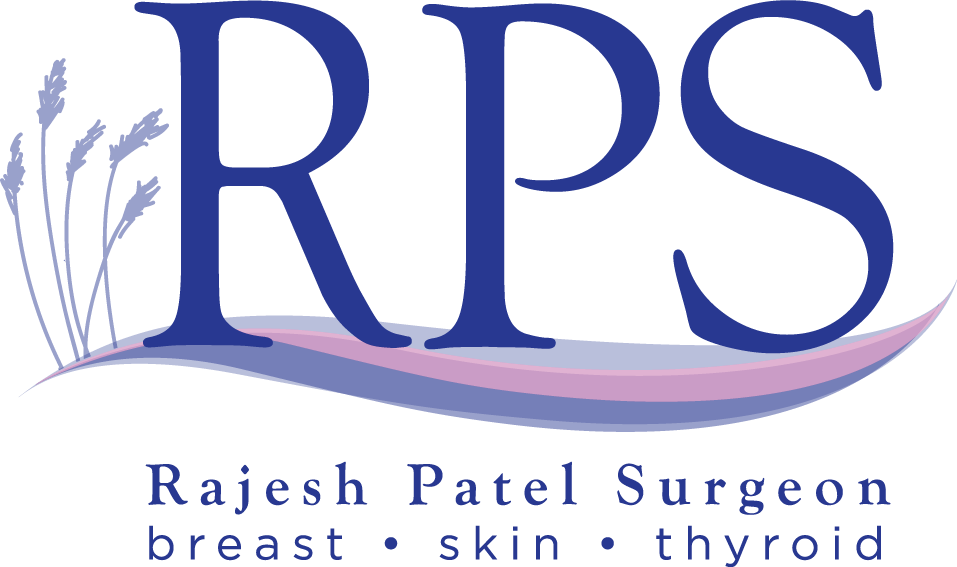The two endocrine diseases that Mr Patel can help with, are certain thyroid diseases and hyperparathyroidism.
Mr Patel spent 12 months in Calgary, Canada, working with Professor Janice Pasieka, one of the world leaders in Endocrine Surgery. He trained in the pathophysiology of thyroid and parathyroid disease, and more importantly the specific surgical techniques when operating on both of these organs. He is a full corresponding member of the American Association of Endocrine Surgeons, the International Association of Endocrine Surgeons, the Asian Association of Endocrine Surgeons, and the Australasian Association of Endocrine Surgeons.
Thyroid
Thyroid nodules
The most common reason to be referred to see Mr Patel is the presence of a thyroid nodule. Thyroid nodules are growths of the thyroid gland and can be any size. Thyroid nodules are very common – approximately 75% of the population will have a thyroid nodule. Only 5% of all thyroid nodules are cancerous, which means that 95% of them are benign and nothing to be concerned about. The two methods of investigation of a nodule are firstly a thyroid ultrasound scan and secondly a fine needle aspiration (often ultrasound guided). Mr Patel will talk to you about both of these investigations and how they help in the management of your thyroid nodule. Thyroid nodules, when very large can lead to difficultly swallowing, breathing or changes in your voice. If you have these symptoms with a thyroid nodule, surgery is sometimes recommended to remove the nodule and help alleviate these symptoms, Mr Patel will ask speific questions to determine how problematic the nodule is.
Thyroid Ultrasound Fine needle aspiration (USS FNA)
Mr Patel has been trained to perform this safe, quick, relatively painless procedure in the clinic. He has performed over 300 USS FNAs. This procedure can be performed in the clinic. During the procedure, Mr Patel will use an ultrasound machine to obtain a small sample of cells from the nodule. This is important to determine the nature of the thyroid nodule. He will talk you through this procedure. There are no specific preparations to be done for the USS FNA, this procedure is important to determine the nature of the nodule.
Thyroid Cancer
If you are diagnosed with a thyroid cancer, Mr Patel will discuss in detail your treatment options, including surgical options and any further treatment that may be required. Not all thyroid cancers are the same. It is therefore important to see a specialist in this area. Mr Patel discusses all thyroid cancers at the Head and Neck MDM which is run through Auckland Hospital, Mr Patel regularly operates on Thyroid cancer.
Overactive thyroid
Almost all patients with an overactive thyroid will NOT need surgery and will be best referred to an Endocrinologist. If the endocrinologist, however, determines that surgery is indicated, you will then be referred to see Mr Patel. This usually occurs when non-surgical options, such as radioactive iodine or thyroid suppressive tablets have not worked. Mr Patel will thoroughly discuss the benefits and risks of thyroid surgery (when the thyroid is overactive).
Parathyroid
Hyperparathyroidism
Hyperparathyroidism is one of the main reasons for being referred to see Mr Patel. This occurs when the parathyroid glands in your neck become overactive and increase the amount of calcium in your blood. This is usually detected with a blood test. Most patients with this disease actually have no symptoms. Some, however, may develop kidney stones and others may have a reduction in their bone mineral density (how strong your bones are) detected with a bone mineral density scan. Sometimes some patients can have vague symptoms, such as irritability, depression, lethargy, and anxiety. Mr Patel will organise appropriate investigations which include:
- Neck (thyroid and parathyroid ultrasound scan)
- Parathyroid SPECT CT scan
- Blood tests
- 24 hour urine test
He will guide you through the pathophysiology of this disease and more importantly how he can help with surgical excision of the gland. The only curative treatment for hyperparathyroidism is surgery. Surgery involves either be a minimally invasive parathyroidectomy or a bilateral neck exploration and parathyroidectomy.
The main risks from surgery include bleeding, infection, recurrent laryngeal nerve injury, permanent hypoparathyroidism and further surgery if the disease is not cured during the first surgery.
Most patients spend between 1-3 nights in hospital and some will require calcium tablets for a few weeks post operatively.
